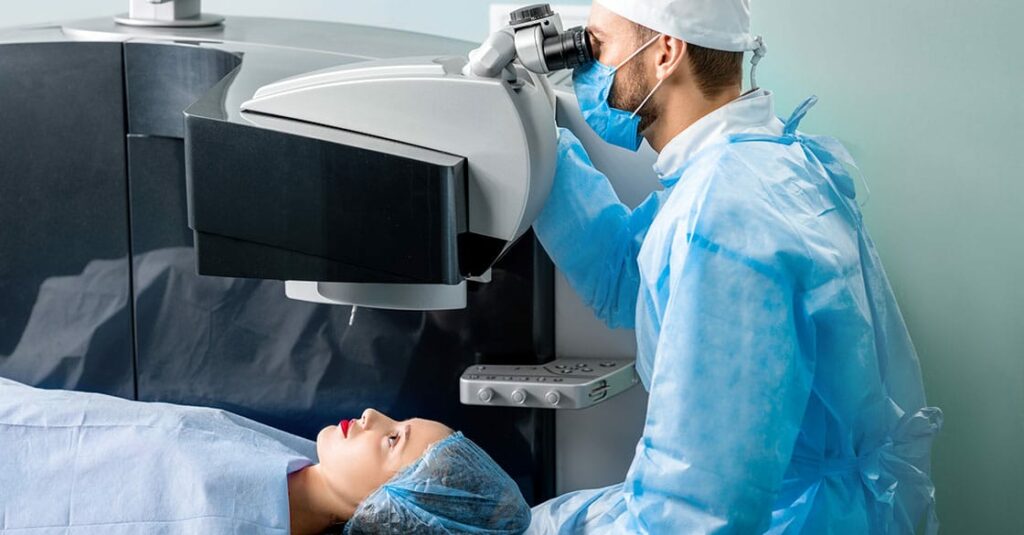Corrective Eye Surgery for Astigmatism: Pros and Cons

Astigmatism, despite the scary-sounding name, is a common vision problem in which the shape of the cornea is irregular or asymmetrical. Mild astigmatism is quite common and does not result in vision problems. When accompanied by a refractive error such as nearsightedness or farsightedness, it causes problems in sight like blurred vision, watering of eyes when straining them. What causes refractive errors are not certain, but if you have had astigmatism for a while, you know what astigmatism looks like. The contributing factors can be age, genetics, or even a physical injury. However, most refractive errors can be easily corrected with contact lenses, glasses or LASIK (a corrective eye surgery).
Corrective eye surgery is a good option if you are wondering how to correct astigmatism. By undergoing a corrective procedure, you’re ensuring that you are not required to wear glasses or contacts. Many patients who have opted to have their vision corrected have had the condition for years and want to let go of their lenses or glasses for good. Here are the pros and cons to help you make an informed decision.

Pros of Corrective Eye Surgery:
– Greater Freedom and Mobility: Corrective eye surgery is one of several forms of vision surgery that can drastically improve quality of life. Vision correction not only offers you freedom from lenses or glasses, but it also helps you live a more active and fuller life. You do not have to constantly worry about glasses/lenses while biking, working out, running, or playing with your kids. Your range of vision is not limited anymore, and you can enjoy many activities that were previously restricted.
– Immediate results: The results of the surgery are almost immediate. Most people can resume normal activities within two to three days, and improvement in vision can be noticed in as little as a few hours’ time.
– Daycare Procedure: This surgery is a minimally invasive procedure that generally does not require hospitalization, and you will be discharged on the same day. However, you need to make arrangements for a cab or someone to drive you back home as your vision will be blurred for a few hours after surgery. The surgery itself requires less than half an hour and a major portion of this time is utilized for preparing the eyes for the surgery.
– Astigmatism Surgery Aftercare: a simple process and consists of a combination of antibiotic eye drops to prevent the risk of infection and lubricating eye drops to help with symptoms of dry eyes in most individuals.

Cons of Corrective Eye Surgery:
– Eligibility: One of the major drawbacks of the corrective surgery for astigmatism is that not everyone is eligible for the procedure. If you are over 40 years of age and have presbyopia, you may be ineligible for the procedure. These are not rigid criteria as you may still be eligible for the procedure depending on your specific conditions.
– Side Effects: Some people may also complain of night-time glare or halos around objects.
– Dry Eyes: Dry eyes after the operation is a common side effect and may last for about three months. They are easily managed by a prescription of teardrops that reduce the irritation associated with it. The risk of developing permanent dry eyes is very rare.
– Need for Repeat Surgery: Individuals who have a very high prescription may experience myopic regression. This is a condition where there is a slight reduction in the quality of vision. It should be remembered that the decrease in vision is never to the same level as before the procedure. Such persons may be recommended a repeat surgery, but it carries its own risks.
– Dislodging of the Corneal Flap: During a corrective surgery with LASIK, a flap is created on the cornea. This flap heals by itself and is not secured. There is a small chance that the flap may get dislodged due to physical trauma even years after the surgery. If you are a sportsperson or enjoy active sports, then you should consider a PRK instead of LASIK. Before making a decision, find out more about the pros and cons of LASIK eye surgery versus PRK.
Your eye doctor will guide you with a thorough examination, determining if this process is meant for you or not at your current age.
